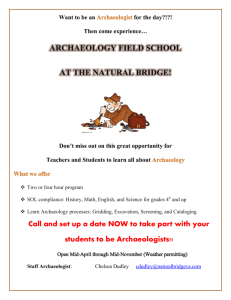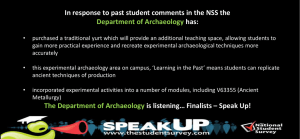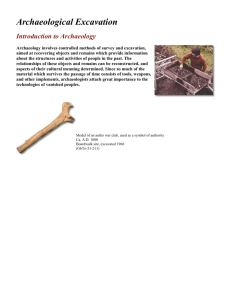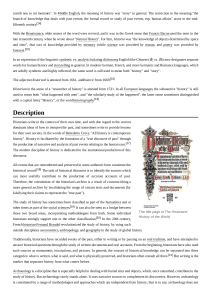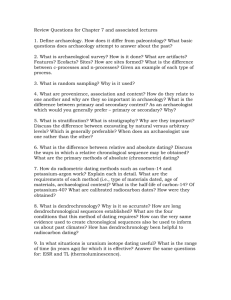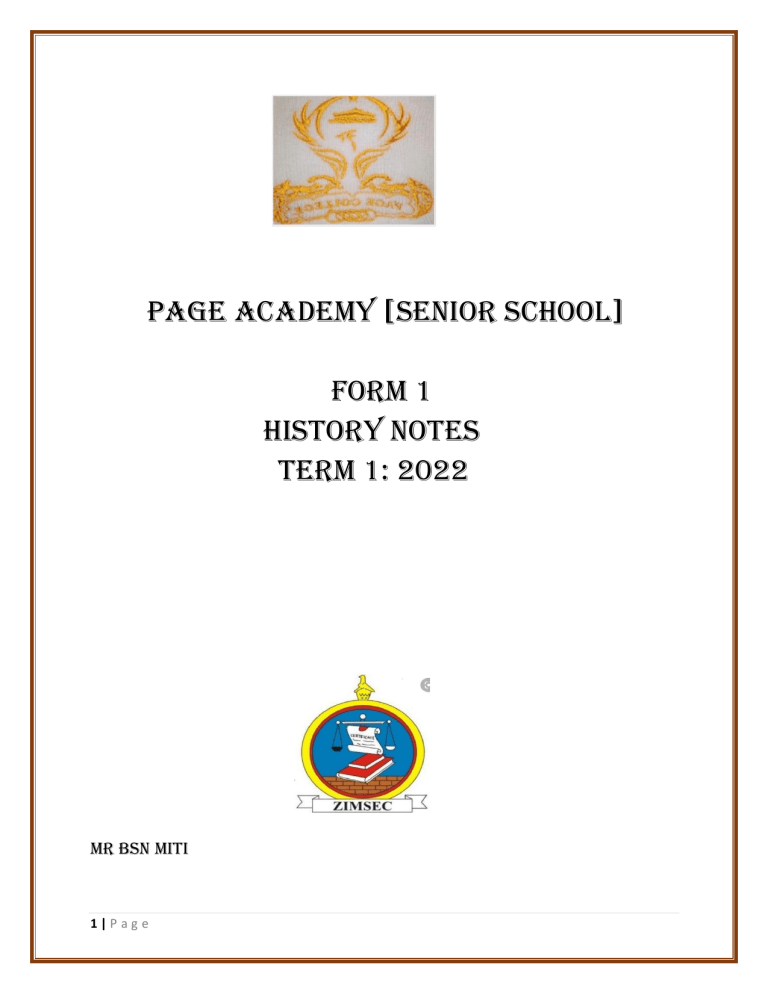
page ACADEMY [senior school] FORM 1 HISTORY NOTES TERM 1: 2022 MR BSN MITI 1|P ag e Conceptualization of History 1.0 Objectives By the end of the Topic learners should be able to: a.)Define the term History. b.)Give reasons for studying History. c.)List methods of collecting Historical Evidence d.)Describe the main sources of History e.)Explain the advantages and disadvantages of each source of History f.)Identify and describe the different types of History g.)Develop a sense of pride towards their country 1.2 What is History? 1.2.1 The origin of the word History History is associated with the Greek word “Historia” which means “information” or an “enquiry” designed to “illicit the truth” 1.2.2 Definition There are so many different definitions of History: 1. History can be defined as the study of what happened in the past. 2. History is the story of man’s struggle through the ages against nature and its elements. 3. History in its broadest sense is everything that ever happened. 4. History is the study of people’s life, behavior and activities – their glories, success, failures, kindness and cruelties (Events). NB: Therefore the above definitions explain History as a significant records of the past, in meaningful story of mankind depicting the details of what happened to men. Mainly it deals with the Human world. In studying History, we are learning about how, why and when these events occurred. Events: Droughts War World Cup CHAN Eclipse of the Sun or the Moon Independence 2|P ag e Corona Virus Pandemic (COVID 19) Grammy Awards BET Etc. History can also be about development – How people organize their lives in the past, their work, the tools and weapons they invented and used, as well as how people’s culture and beliefs changed over time. History is therefore a study of people, places, events and changes that happens in the past NB: It also involves studying different views of what happened in the past. This makes history an enquiry into , and an investigation of , the past action and developments, changes and progress of human beings and anything else that matter e.g History of a School – Page Academy, Town (Salisbury – Harare), Streets (Samora Machel Avenue, Robert Mugabe Street , etc. in Zimbabwe),bridges ( Beitbridge and Birchenough Bridge) Therefore people are making History through their activities / their struggle for independence, democracy (political history) and their struggle to use the environment so that they produce food (Economic History) Work to do? Exercise 1 1. Write three definitions of History? [6marks] 2. Who makes History? [2marks] 3. How is History made, give four examples? [4] 2.0 Dating System The subject of History works with a lot of dates therefore we need to know when it took place, that is, in which year, the day, the month and century. It is common that dates are written in AD or BC and sometimes in the 17th or 18th century and one would wonder what this is all about. - AD – Anno Domini (in the year of the Lord) - BC – Before Christ - 1000 years – Millennium - 100 years – Century - 10 years – Decade - 17th Century- 1600- 1699 - 20th Century 1900-1999 - 21st Century 2000 -2099 3|P ag e Anno Domini – AD/ Before Christ –BC The terms anno Domini and Before Christ are used to label or number years in the Julian or Gregorian Calendars. The term anno Domini is Medieval Latin which means in the year of the Lord. But is often translated in the year of our Lord. It is Dionysius who introduced the AD system in AD 525, counting the years since the birth of Christ. In an attempt to stabilize, the date of the celebration of Ester. He was seeking to bring the Eastern and Western Churches into agreement on single day on which all Christians would celebrate Ester. This calendar era is based on the traditionally recognized year of the conception or birth of Jesus of Nazareth With AD counting years after the start of this epoch and BC denoting years before the starting of the era. There is no year zero in this scheme so the year AD 1, immediately follow the year 1 BC. This dating system was devised in 525 but was not widely used until 1800. Gregorian calendar (1582) Also known as the Western or Christian Calendar is the most widely used today. Its predecessor was the Julian calendar. Which was replaced because it did not properly reflect the actual time it takes the Earth to cycle once around the Sun. Work to do Exercise 2 1. Put these dates into the correct Chronological Order A.315 AD B.44 AD C.1871 AD D.1779 AD E.3 AD F.2021 AD [6] 2. Work out the centuries for the following dates: A.1066 AD B.1215 AD C.210 AD 4|P ag e D.1485 AD E.1745 AD F.1899 AD G.902 AD H.55 AD I.2021AD [9] 3. Give the years represented by the 14th, 15th , 16th and 20th Century, and indicate the century in which we are surviving now. [5] 3.0Why do we study History? 3.1 Importance of History The importance of History is that it help us to : Understand our past and learn how we came to be what we are? – Our present societies are a product of our History and the future generations shall depend on what happens today. Knowledge and understanding of the past can help us to create a better social and economic order for present and future generations. We can improve the present and the future by understanding how people in other societies lived and what forces affected their lives and what actions they took.(Comparative study) We can work to avoid mistakes and those made by other people and generations before ours. We can learn to identify our friends, enemies, Heroes and Traitors and learn why they came to behave and act in the way they did. In order to develop skills of research and analysis – Critical thinking i.e identify and analyze problems ,collect, select evidence,facts,opinions,establish relationship, establish relationship, draw conclusions and advance arguments in support of. Such skills are used in many jobs in our society. Historical Knowledge helps us to increasingly understand our present struggle, to create a just and equal society. Helps to boost confidence in ourselves by creating a sense of identity towards our country (Patriotism)/ Nationalism. It also helps us to correct some errors done by our ancestors unlike just leaving in an edge of continuous error eg the killing of Albinos and Twins. NB: History repeats itself. To avoid this we should always keep record and learn from events of the past, copy the good and avoid the bad. Therefore we can then confidently say History is a necessity and we cannot live without it. 5|P ag e Work to do Exercise 3 1. Who makes History? [2] 2. Give 5 reasons for studying History [5] 3. What is the meaning of the following words? Epoch Era Evidence Analysis Research [5] 4.0Ways of recovering History 4.1Sources of Historical evidence 4.1.1 Introduction A person who studies rights and analysis Historical Changes is called a Historian. A Historian searches for facts about events that happened in the past These facts are called evidence. It is all up to Historians to choose the facts which are of relevance or importance. Sometimes the Historians may agree and sometimes they may fail to agree on certain Historical issues why? This is very possible even in the stories in which they witnessed, this is for one reason or the other, and primarily it’s because of sources of Historical evidence and other things like values, prejudice, etc. They are so many sources of collecting Historical evidence and the main are namely: oral tradition, written records, archeology/ rock painting, pictorial or visual sources and others like anthropology, linguistics etc. 4.1.2 Oral Tradition This is the passing of information from one generation to the other by the word of mouth e.g these are spoken stories, poems or songs passed down through families or generations. The information is passed by elders. Children can actually be told about their family History by their Grandparents. For instance when one wants to establish information about the Zimbabwean liberation struggle an interview with a member of the War Veteran can be carried out. 6|P ag e Therefore Oral sources are interviews and folk stories that are passed down by older members of the community. 4.1.2.1 Advantages of Oral tradition It can give us information like names of people, language, totems, color, rise and fall of states etc. It is cheap to obtain. It provides the opportunity to talk to the person who actually participated in the Historical event. Therefore you can ask questions to clarify. It’s not expensive, anyone can get the information, as there is no need for expertise, as well as people who can’t read or write. Songs and poems cannot be easily be changed. Thus they will always give us reliable information. The story teller’s tone, gestures and facial expressions help bring out feelings or emotions. It can give valuable information, where there are no written records, and feels the gaps for archaeology. It is enjoyable, as one’s duty is only to listen and the story teller can tell the story in a more interesting way. 4.1.2.2 Disadvantages of Oral tradition It depends on memory, that some important information can be forgotten, especially when one reaches the age of 70. The cultural mixing and cultural erosion, can twist the real meaning of some Historical facts and this is common for populations that live in urban areas. One may decide to lie on certain events or leave out other information for one reason or the other – this is mainly common when those events involves cruelty or bad memories. Information can be exaggerated (Biased). It usually does not give specific dates – relies on natural events. Mostly it is the history of great people and events which are told and it ignores the History of the ordinary people. The one with the relevant information may die without having passed it on to others. There is high chances of distortion of History as it is passed on from generation to generation. 4.2.0.0 Written Records Historical facts can be gathered from documents found in archives, museums or libraries. 7|P ag e The written records/ evidence is divided into primary and secondary evidence. 4.2.1 Primary Evidence Such documents or information are written by the actual doers themselves – people who were directly involved and witnessed the events e.g Colonial rulers / administrators These officials used to write personal and official letters to their home countries , most of which are now stored in archives and libraries (Primary documents) The information / documents can come in the form of diaries, letters, newspaper articles, notebooks, research papers or manuscripts. A good example is an original copy of the Rudd Concession signed by Lobengula in 1889, now stored at the National Archives of Zimbabwe. Other examples are court papers, birth certificates, death certificates NB: Leave a page for pasting primary sources. 4.2.2. Secondary Evidence This evidence is found in published textbooks e.g your people making History Bk1, African Heritage BK 1 etc. Secondary evidence is the analysis of primary evidence and other sources of Historical evidence. Therefore textbooks are good example of secondary evidence 4.2.3 Advantages of written records It provides detailed information given in a chronological order. It tells us other information that archaeology can’t tell us. Information can last long as long as the document is available It provides accurate dates, people can access the same document from different places Pictures can be shown which enhances understanding If one forgets some of the information, reference can always be made for the same document, as many times as possible. It is more reliable if written by the actual doer. 4.2.4 Disadvantages of Written records The writer can be biased (Comments Prejudice) Secondary information can be distorted Papers may be destroyed by fire, water, insects or such reasons as providing crime. 8|P ag e It only tells us what the writer , is willing or comfortable to share with us There is nobody to ask questions , if one has not understood The writer may not be available to justify or give clarity to his or her work. The people who are able to read, are the only ones who can get this information. It is costly, as books needs to be paid for. It does not give a clear picture of the mood or the reason to which the information was written. 4.3.0 Archaeology This is a scientific study of remains of the physical remains of the past such as Pottery, Holes, jewelry, rock paintings and other remains that are found at Historical sites. Historical sites are areas such as Great Zimbabwe, Naletale, Khame ruins, Old Bulawayo, Manyanga These physical remains are called artifacts or fossils. Such items or artifacts when properly studied and analyzed can give us useful information about life in the past , about how people dressed, how people got their foods, the type of tools they used and whom they traded with. A person who studies these objects or artifacts is called an archaeologist. Archaeologist can determine the age of these physical remains like bones, through a method called Radio Carbon Dating. The Radio Carbon Dating method is a scientific method which is used to give us dates. A good example of an archaeologist is Dr Leakey who dug at Olduvai Gorge in Tanzania and discovered one of the oldest fossils of a by pedal ( two legged creature – which he named Zinjathropus – The earliest man) It is from that discovery that Africa is now called the cradle of Humankind. NB: Leave a page to paste pictures of rock paintings and pottery remains. 4.3.1 Advantages of Archeology Accurate dates and information can be provided through Carbon Dating. The objects can be tested and verified. As the objects are studied in a laboratory by scientific methods It can give information of things which happened before anyone can record (Prehistoric Era). Information on how people got their food , the sort of homes they lived in, the tools they used and who they traded with can be obtained ( Mapumbugwe – Prehistoric Societies) Studies are carried out by professional people (Archaeologists) 4.3.2 Disadvantages of Archeology It can’t provide us with such information as names of kings, totems, languages, color or names of places or artifacts. 9|P ag e It is an expensive method as it requires complicated machinery and very professional people (specialized) There is no body to ask questions in order to clarify issues. The problem of archaeology is that it cannot trace items such as food, clothing materials like hats, skins, fiber and wooden items like Hoes, pillows, walking sticks and baskets because they rot. NB; Therefore Historians need to combine archaeology with written, oral sources and others to get a complete story. 4.4.0Other sources of Historical Evidence 4.4.1 Pictorial or visual sources of History These are pictures which might have been taken some years ago e.g Pictures or visuals of Historical sites, of prominent figures, vintage cars, etc. Pictorial sources tells us about the way of life about the people, how they dressed, the weapons and tools they used, as well as their staple food. However, care must be taken when using these pictures because some of them they come from the painter’s imagination. They do not explain themselves enough and need explanation and this is the task of Historians. They are also modern forms of pictorial or visual sources , these include photographs or video tapes, cartoons, drawings, maps , paintings and diagrams ( Primary sources) NB: Leave a page to paste pictures. 5.0 Distortion of History 5.1 Definition Is a change, twist or exaggeration that makes something appear different from the way it really is. All sources of historical evidence are subject to distortion or misinterpretation for one reason or the other. Information can actually be twisted thereby changing the meaning of the story. For example a family may leave out the family of defeat, cruelty and some unpleasant information, wishing to portray that there were always strong, brave and good people. Another example is that of colonial Historians, who may choose to distort Historical truth of colonialism in order to justify colonial rule. Some writers can distort a people’s History as a result of their class background , prejudices and their own view of the world e.g Racists, Capitalist, Socialists, NB: Therefore the best way of coming up with a way balanced history is to use all the sources of Historical evidence , as they can help each other cover weakness (Multidisciplinary approach) 10 | P a g e E.g. As was done with the History of Great Zimbabwe Oral tradition supplied the names of the Kings of the states Archaeology provide that the state was founded in the period around 1100 AD. As well as that the people practiced livestock and crop production. Written records went on to give documents by Swahili Arab trades and these records have provided information on trade relations. Thus with different sources working together, a complete record of Great Zimbabwe can be constructed. 6.0 Environment and factors of production 6.1 Introduction It is important in History to know something about the environment of the people of people of society they are studying i.e. the need to know the place (environment) these people were living and what effect this has upon their behavior and actions. (Comment) The way in which people tried to tame or control their natural environment often determines the course of their History, e.g. the people of Egypt were forced to live along the Nile River. It is along the river that these people learnt to use the river for fishing, transportation in order to survive. Again it is important to understand how the economy in each particular society is organized. Social and even political changes in any society are often a result of the way in which land, labour and wealth / Capital are controlled and distributed. These three factors: land, labour and wealth/ capital are refered to as agents or means of production. In the 19th Century Karl Max put forward the 5 stages of Human Development a society can go through and these are: communalism, slavery, feudalism, capitalism and socialism. And in each stage , the History of mankind is characterized by class struggle 6.1.1 Communalism Marx considered this to be the first stage of Historical development. In this stage property was owned equally by the whole community. Work was done together and goods shared. 6.1.2 Slavery The second stage is the period of slavery i.e. when some people within families gained control over weaker family members or one group in a society controlled another. This could have happened as a result of talent and specialization. Slaves performed many tasks. But their main job was to produce food for their masters 11 | P a g e 6.1.3 Feudalism This is the third stage, when agriculture was the main branch of production. Land was owned by a few people known as the landlords The rest of the people worked for the landlords were called surfs and they were landless. 6.1.4 Capitalism This is the fourth stage , when the wealth of the society was produced by machines or by workers in factory, mines, industries, banks etc The means of production are owned by a few individuals. ( factories , mines, banks etc) As in feudalism there is unequal distribution of wealth. These workers are commonly known as proletariats. The workers are not forced to work on the same land like in feudalism, they are free to go and seek employment were they could find it. Their labour could be bought and sold. 6.1.5 Socialism This is the fifth stage and the highest stage of human development. In this stage economic equality would be restored. Work and wealth would be shared among the people It is this stage of development in which the society is ruled by the government of the people for the people. NB: Throughout the study of History you will see of how economic changes led to new ways in which people lived together and organized their society as was pronounced by Karl Marx. 7.0 Types of History They are many types of History and the major ones being political, economic and social history. There is also colonial, local History, Constitutional History and others. 7.1.1 Political History It is about how members of the community rule each other and the means or ways in which authority is established. This can be a village, district, Province or a Country. In studying political History, Historians in who the Head or lead is and how is he chosen, who makes the laws and who enforces the laws. For example in Zimbabwe Councilors, Members of Parliament, The Senate and the State President are voted during elections. 12 | P a g e We have three pillars of the state (Branches of Government) namely: The executive (President and Cabinet), the judiciary Judges and Magistrates and Legislature – Parliament and the Senate. In short political History looks at political leaders how they rule and events such as wars and invasions that influence society. 7.2.1 Economic History It looks at how people make a living It explains how they work and produce food. This kind of History is concerned with how people satisfy their basic needs. People have 3 basic needs namely food, shelter and clothing. People cannot survive on 1 economic activity but a combination of the factors make up an economy. This include: Hunting, gathering, crop cultivation, livestock production, iron making, pottery, mining, fishing, banking, craftwork, tribute. 7.3.1 Social History This deals with the way of life of the people and their communities, this forms the norms and code of conduct for the society, thus the relationship and cultural practice are taken into consideration. This is when we talk of marriage systems, religious life, classes of people, education, dressing ,etc. This forms the culture of the people and it is dynamic. 7.4.1 Local History This study of History is concerned with a specific area, small geographical area such as village, town or a school like yours, etc. The History of your School will include: how it got its name and when it was built. It will record the teachers, the pupils who formed the school, the uniform, how the school developed over years and the important events of the school. 7.5.1 Personal History It is the individual’s story about his or her own past. When this story is written by the person himself, it is called an auto biography. However, when a person’s History is written by somebody else it is called an autobiography, for example the story of Jesus Christ was written by St Mark, St John and St Luke. 13 | P a g e 7.6.1 Family History Refer to family tree or family Genealogy. Exercise 4 1. What is History? [2] 2. Define the following terms: a.Events [1] b.Evidence [1] c.Environment [1] d.Culture [1] e.Beliefs [1] 3. Fill in the gaps: History is about _________that took place in the past. How people _________ their lives in the past their________________ and their ___________ and their societies and the ____________ and ___________ they inverted as well as people’s _________and_______changed over time [8] 4. History can also be taken as record of people’s lives ___________ and __________ including their _________, ______________, __________,__________ and _________ [7] 5. History is not only made by people. Natural happenings are also part of History. Give three examples of natural events which you know, which are of Historical importance. [6] Exercise 5 1. List 5 important reasons why we study History. [5] 2. Who makes History? [1] 3. How is History made? Give two examples. [3] 4. Why is environment important in the study of History? [3] 5. What is a generation? [2] Exercise 6 1. What does a Historian do? [1] 2. Name three types of Historical evidence a Historian can use. [3] 3. Give two advantages and two disadvantages of each of the ways of recovering History. [12] 4. Describe how the disadvantages of Historical sources can be avoided. [2] 14 | P a g e 5. What is meant by distortion in History.[2] Exercise 7 1. Define the following terms: a.Analyse [2] b.Archaeologist [2] c.Distortion [2] d.Patriotic [2] e.Chronology [2] 2. What is the difference between primary and secondary sources of History and give examples of each.[8] 3. Primary sources are usually found in _________, ___________ and _________. 4. What are fossils and give three examples of them. [4] 5. What is the other name for fossils.[1] Exercise 8 1. What is prehistory [2] 2. Why is it that Africa is called the cradle of mankind. [2] 3. What is archaeology.[2] 4. What is the name given to the method used by an archaeologist in establishing dates.[2] 5. What was the name of the Archaeologist who excavated at Olduvai Gorge in Tanzania and discovered a bipedal creature? [2] 6. Why is it that much of the African History has been recovered through Archaeology.[2] 7. List the Names of three Historical sites you know. Exercise 9 1. Define the following: a’ Bias.[2] b.Exaggeration .[2] 15 | P a g e c.Reliable.[2] d.Eye witness.[2] e.Memos.[2] f.Propaganda.[2] 2.Name four types of History? [4] 3.Explain what is meant by the following: a.Subjective views.[3] b.Objective views.[3] NB: All exercises are to be answered in your Test and Assignment exercise books as directed by Mr Miti. >>>>>>>>>>>>>>>>>>>>>>>>>>THE END>>>>>>>>>>>>>>>>>>>>>>>>>>>>>>> 16 | P a g e
